- Bernard Preston homepage
- Lignans
What are lignans?
What are lignans is a question for those wanting to avoid breast and prostate tumours; and who are anxious about disease in general. They have an important role to play in preventing cardiovascular conditions too.
With malignant breast and prostate tumours soaring the world over, scientists are looking at isolating the proven ability of these phytonutrients; found mainly in whole grains, nuts and seeds to help prevent and treat disease.
It's a complex subject but the practice of millers to extract most of the nutrients from whole grains in the grinding of flour has meant that women in particular have unknowingly lost this scientifically-proven protection given by their food.
Added to that is the fact that many people eschew whole grains, choosing rather the refined alternatives; now society has a major health problem on its hands.
Lignans also help lower the dangerous low-density lipoprotein blood fats; and inflammatory markers, emphasizing the important role they play in the prevention and treatment of cardiovascular disease.
The refining of wheat and maize in particular, extracting these important phytonutrients has contributed greatly to many serious diseases. The refusal of modern man to eat chewy whole grains simply adds to the problem.
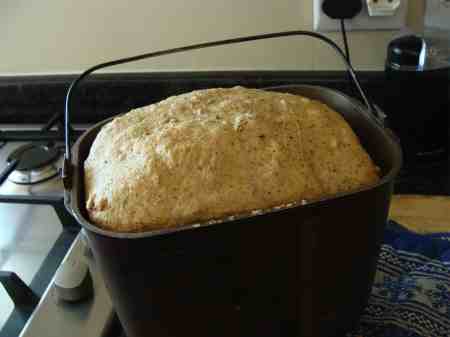
Sourdough bread made from 100% real wholegrain flour need not be heavy; slices from the loaf above are surprisingly light.
Just one slice of this true wholegrain bread reduces the risk of a malignant breast tumour by nearly 50%; that's massive[7].
In fact the flavour is outstanding in comparison with the tasteless commercial loaf of today.
What are lignans?
Lignans are bioactive polyphenol nutrients found in particularly large amounts in sesame and flax seeds; but also in the bran of all grains.
In the gut they are used as food by the microbiota; the friendly bugs in the colon synthesising "enterolignans." They have a structure very similar to circulating oestrogens in the blood, competing with the human hormone for absorption at sites on the cells of breast tissue.
There are many different lignans found in whole foods; yet they have no known nutrient or caloric value. Their chief function it would seem is to protect us from serious diseases.
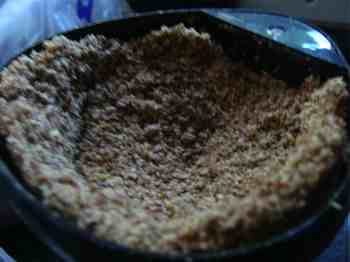
Sesame and flax seed are by far the richest sources of lignans. They need to be ground just before consumption as in the coffee mill above; otherwise they pass through the alimentary canal unchanged.
Broccoli surprisingly also has a very large lignan content; another reason why it is considered queen of the cancer-preventing vegetables[6]. In fact per helping it has more even than flax seeds.
There are almost no lignans in animal products.
Flax seeds are also rich sources of omega 3 fatty acids which begin to oxidize once exposed to air; eat them only freshly-ground.
Lignan consumption in most Western countries is very low, usually less than 1 mg per day[1], due to the refining of most grains and low seed intake. This correlates strongly with the meteoric rise in breast and prostate tumours; and cardiovascular disease.
Understanding what are lignans will profoundly improve our chances of enjoying old age with far less pain and disease.
Avoid the refined forms of flax seeds; the oil goes rancid very quickly once the bottle is opened.
Lignans and the prostate gland
Lignans also impede prostate gland tumour proliferation[8].
Scientists are predicting a "prostate gland tsunami[9] with an 85% increase in deaths by 2040." They recommend eating more flax seeds, kale and broccoli; and apricots too.
Lignins
Lignins with an "i" are altogether different; they are the insoluble fibre in whole foods that give the stool bulk. They have many important functions in plants, for example structurally in cell walls; and help them resist diseases. They are particularly abundant in the bran of grains.
Refining of grains removes both the lignins and their cousins, denying us the huge role they play in the gut in the prevention of many diseases.
Microbiome
The absorption of both lignans and their cousins is utterly dependent on the friendly bacteria, yeasts and viruses in the gut; both the total number and the diversity. Known generally as the intestinal flora or microbiome these bugs are able to metabolise these phytonutrients.
Both enterolactone, the compound that is so important in the prevention of breast tumours and the short-chain fatty acids that are formed are at stake; the latter supply energy to the cells lining the gut and have a profound role in reducing the overall inflammation in the body.
To date there is no evidence that lignins with an "i" are digested and absorbed in this manner; they play a very important role though as insoluble fibre in the colon giving the stool bulk and helping prevent constipation with all its attendant ills.
I hope you now understand that what are lignans is not just an obscure subject for academics; it affects us all profoundly.
Lignans and cardiovascular disease
Whilst diets high in lignans are known to reduce cardiovascular disease, many studies using the extracted and synthetic forms of the phytochemicals appear to give wildly different results. In short it remains as always best to get a daily supply of them from our food.
 Branching broccoli goes on bearing for months
Branching broccoli goes on bearing for monthsVitamin E
Complicating the matter is that whole grains and seeds also contain other beneficial phytonutrients such as vitamin E and omega-3 fatty acids, both known to reduce embolisms and inflammation. It is apparent that many different compounds in our diet such as lignans enhance one another's role in preventing disease and promoting wellness; they are true functional foods.
Central to understanding what are lignans and the influence they have on other phytonutrients demands yet more research. In simple terms though humans should not neglect whole grains, nuts and seeds in their diets; we should eat them daily.
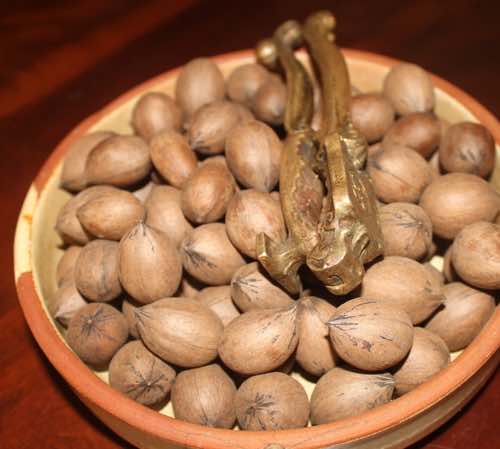 Keep a bowl of nuts permanently on the dining-room table
Keep a bowl of nuts permanently on the dining-room tableMalignant tumours
Several studies showed that the lignins with an "i" component do not lower blood fats but but they do have an important role to play in reducing throat and colorectal tumours.
It is the enterolactones formed from lignans with an "a" that have such an important role to play in the prevention of nasty breast tumours.
It is no coincidence that the word "malignant" and our keyword for today are so similar; they are closely related.
Understanding what are lignans and the role they play in human wellness enables us to minimise many very serious diseases.
Take home
The take-home of all this is that whole grains and seeds have an important role to play in the overall wellness of humans; much has yet to be adequately researched.
But it's clear that 100% whole grains, nuts and seeds need to be consumed regularly. Together with several different fermented foods to support the microbiome they are supremely important.
What are lignans is an extremely important but complex subject; we should all have at least a minimal understanding of it.
Kefir smoothies
Kefir is one of the easiest probiotics to make in the home kitchen. It is a fermented milk product containing over 30 different friendly bacteria, viruses and yeast cells; it is not unlike a very strong yoghurt but with a far wider range of bugs. It is quite sour and so is often made into a smoothie with recently-ground nuts and seeds, fresh fruit and a little natural honey.
This kefir breakfast smoothie is very simple to make once the probiotic is being fermented in the home.
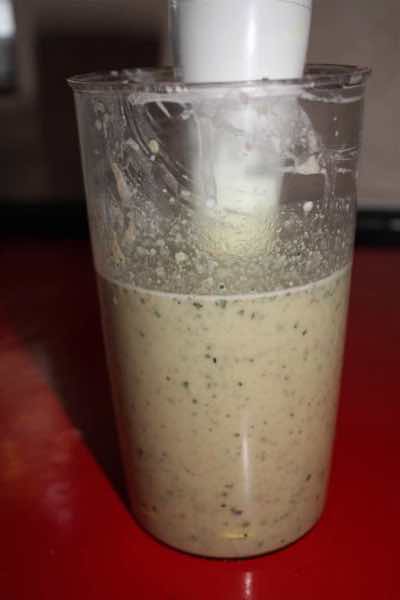
Natural honey[3] has been shown to have little effect on blood-glucose[4] but bananas certainly do and should be limited to a perhaps a quarter or none at all.
Whole grains
"A 2017 cohort study showed that the consumption of whole grain food may protect against breast cancer risk with a 47% reduction rate[10]."
There is overwhelming evidence that whole grains are extremely beneficial but they remain difficult to get. Once the kernel is cracked the important oils and vitamin E begin to degrade so millers routinely remove them to improve the shelf-life.
Corn on the cob is one good source in the summer months; brown rice and baking one's own bread using 100% real flour are also excellent. The latter means knowing someone with a small mill; or purchasing one yourself.
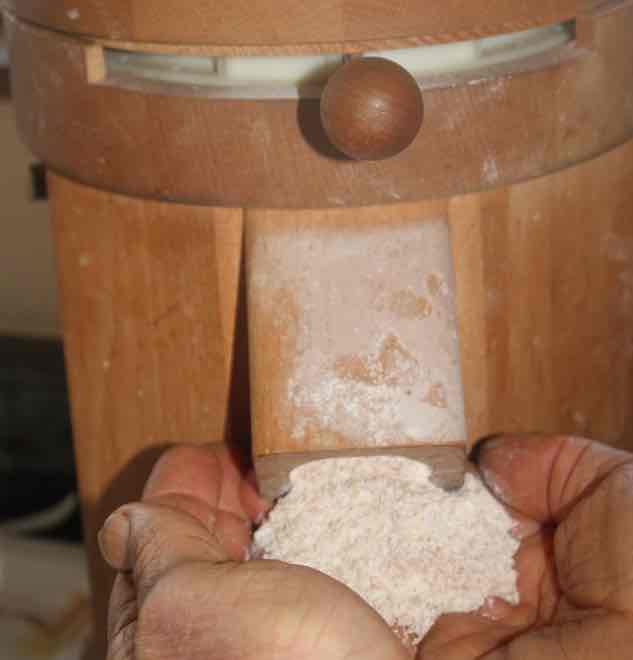
Purchasing a small electric mill[5] and sourcing wheat may seem a bridge too far for most people but, once in the groove, baking one's own sourdough bread need not take more than five-minutes each day.
In short these are thoughts for those who are determined to do everything in their power to avoid malignant tumours of the breast, prostate and alimentary canal; and cardiovascular disease.
Our philosophy
Our philosophy about wellness and unprocessed foods is based on the belief that every hour spent sourcing and preparing nutritious meals will mean far less time spent at the doctor and pharmacist; and much lower medical expense bills and pain.
Much of this deeply cherished belief has been sourced from the five Blue Zones of the world; where ten times as many elderly folk enjoy long, zestful and full lives.
What are lignans? It's a very complex subject; I hope this little summary has been of some benefit.
What are lignans?
What are lignans should also interest all those wanting to be more healthy; and learn more about the prevention of serious diseases.
What is a lignan gives a slightly different slant on the subject.
- Flaxseed Lignans as Important Dietary Polyphenols for Cancer Prevention and Treatment
- Dietary lignans: physiology and potential for cardiovascular disease risk reduction
- Natural honey
- Honey glycemic index
- Electric flour mill. Web: https://tinyurl.com/mrs3etu6
- Naturally Lignan-Rich Foods
- Lignans and breast cancer
- Flaxseed-Derived Enterolactone Is Inversely Associated with Tumor Cell Proliferation in Men with Localized Prostate Cancer
- Prostate Cancer Tsunami Coming, Experts Caution
- Whole Grain Consumption for the Prevention and Treatment of Breast Cancer
When browsing use right click and "Open Link in New Tab" or you may get a bad gateway signal.
Newsletter
Our newsletter is entitled "create a cyan zone" at your home, preserving both yourself and Mother Earth for future generations; and the family too, of course. We promise not to spam you with daily emails promoting various products. You may get an occasional nudge to buy one of my books.
Here are the back issues.
- Lifestyle and ideal body weight
- What are ultra-processed foods?
- Investing in long-term health
- Diseases from plastic exposure
- Intensive lifestyle management for obesity has limited value
- A world largely devoid of Parkinson's Disease
- The impact of friendly bacteria in the tum on the prevention of cancer
- There's a hole in the bucket
- Everyone is talking about weight loss drugs
- Pull the sweet tooth
- If you suffer from heartburn plant a susu
- Refined maize meal and stunting
- Should agriculture and industry get priority for water and electricity?
- Nature is calling
- Mill your own flour
- Bake your own sourdough bread
- Microplastics from our water
- Alternative types of water storage
- Wear your clothes out
- Comfort foods
- Create a bee-friendly environment
- Go to bed slightly hungry
- Keep bees
- Blue zone folk are religious
- Reduce plastic waste
- Family is important
- What can go in compost?
- Grow broad beans for longevity
- Harvest and store sunshine
- Blue zone exercise
- Harvest and store your rainwater
- Create a cyan zone at your home
Did you find this page interesting? How about forwarding it to a friendly book or food junkie? Better still, a social media tick would help.
- Bernard Preston homepage
- Lignans
Address:
56 Groenekloof Rd,
Hilton, KZN
South Africa
Website:
https://www.bernard-preston.com